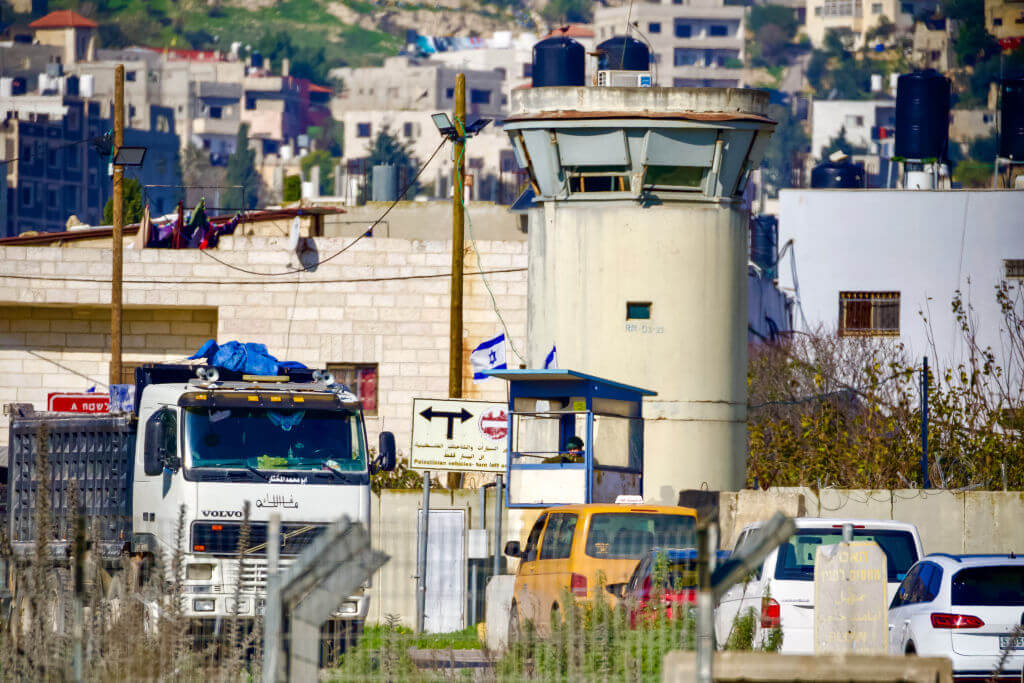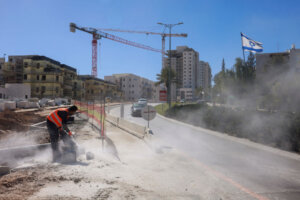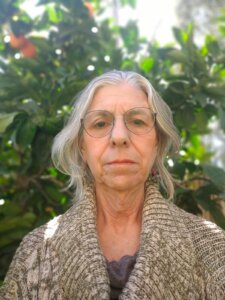Unable to enter Israel since Oct. 7, Palestinians in Wadi Fukin have been left without a livelihood
Faced with the West Bank’s worst economic crisis in generations, Palestinians describe how ‘everything is stopped’

Since Oct. 7, an estimated 150,000 Palestinian laborers from the West Bank have not been allowed into Israel to work. Photo by WAHAJ BANI MOUFLEH/Middle East Images/AFP via Getty Images
Nasser Yacoub has worked for three decades as a builder, contractor, painter and handyman in the Israeli town of Tsur Hadassah, a few miles from his home in the Palestinian village of Wadi Fukin in the occupied West Bank. He speaks fluent Hebrew and grew close enough with many clients over the years that he has a large ring of their house keys from when they asked him to work while they were away on vacation.
But Yacoub, a 59-year-old father of three, like scores of others in Wadi Fukin and some 150,000 Palestinian laborers across the West Bank, has not been allowed into Israel to work for a single day since Oct. 7. As he and his co-workers spend down their savings and worry about their futures, some in Tsur Hadassah who feel badly about the situation have given food and other supplies, and helped a handful of Wadi Fukin families start a small business selling homemade Palestinian dishes to Israelis.
“Most of the men in Wadi Fukin are just sitting at home, and this bothers their wives,” Yacoub told me when we met recently at a gas station overlooking the village sandwiched between Tsur Hadassah, which is inside Israel proper, and the West Bank settlement Beitar Illit.
”There is no honorable life here anymore,” added a well-known resident of Wadi Fukin who works for the Palestinian Authority and spoke on the condition of anonymity for fear it would anger officials there. “People can’t pay their electricity and phone bills. People who don’t have medical insurance can’t pay for their pills; there is no milk for children. Everything is stopped.”
The frustration and desperation in Wadi Fukin is a microcosm of what experts say is the worst economic crisis to seize the West Bank in generations. A February World Bank report said the overall economy shrunk by 22% in the fourth quarter of 2023. Last month, the Palestinian Authority announced it could pay its tens of thousands of civil servants only half their salaries. Bloomberg News reported this month that unemployment in the area had doubled to 30%.
And the situation worsened on Wednesday, when Israel’s finance minister, Bezalel Smotrich, announced he would withhold taxes Israel collects in the West Bank on behalf of the PA as punishment over the move by three more European countries to recognize a Palestinian state.
Rabeh Morrar, research director at the Palestine Economic Policy Research Institute, said the situation is “even worse” than the downturn during the Second Intifada, the violent Palestinian uprising — and attendant Israeli crackdown — that raged from 2000 to 2005, or the long COVID-19 lockdown. And it is hitting across socioeconomic sectors, in cities as well as rural areas. Morrar’s brother, for example, is one of several restauranteurs in Ramallah who have shut down in the last few months because their former customers can no longer afford to eat out.

“People are buying on credit from grocers, using their savings, and there is a kind of solidarity with people helping others,” he said. “But this cannot be sustained forever. If this continues, even rich people won’t be able to help others.”
After the attack in which Hamas and other terrorists killed 1,200 people and kidnapped some 250 others to Gaza, Israel immediately barred Palestinian workers with permits — about 130,000 — from entering its territory. That restriction has held, except for about 8,000 people deemed “essential.” Another 30,000 or so Palestinians who worked illegally in Israel before Oct. 7 have also been unable to do so since because of a crackdown at checkpoints.
Wajdi Manasra, a member of the Wadi Fukin village council, said that its residents have been barred from entering Israel since the war began nearly eight months ago, including 15 who used to work for the Tsur Hadassah municipality. The PA worker who lives in Wadi Fukin estimated that more than 60% of the village’s 1,500 residents depended on income from construction and agriculture jobs in Israel, where wages are higher than in the West Bank public or private sectors.
Manasra said that 10 workers were allowed into Beitar Illit, the West Bank settlement near the village, on Monday for the first time, but stressed that was little comfort. “People feel pressure all the time,” he said. “This situation is causing psychological problems.”
Yacoub, the man with the ring of keys from Tsur Hadassah clients, said he had some money saved up, so is better off than many, but he is still feeling the pinch and the future looks dark.
“When you don’t have money, everything changes,” he explained. “You cut down your purchases. You have to keep money so you can go on for a longer time and don’t end up in a situation where you are only eating pita.”
His worst enemy now is boredom: He spends most days watching TV, at the computer, reading or talking on the phone. “It’s the opposite of before, when I worked like a human being,” he told me.
And he is deeply worried about his 29-year-old son, Leith, who worked alongside him in Tsur Hadassah and was supposed to eventually take over the business.
“Now he sits at home and feels that his future is in jeopardy,” Yacoub fretted. “Getting married, having a house. Everything has stopped.”

Tsvia Horesh, a music therapist in Tsur Hadassah, joined with some of her neighbors to try to help the Wadi Fukin workers starting in December. They collected money and bought diapers, powdered milk, baby formula and medicines to give to the construction workers, and also gave farmers money to buy seeds.
Before Passover, they sent bags of chametz to 10 families in the village — and when the holiday was over, they donated the matzo they had leftover. Each time, someone from Tsur Hadassah drives through an army checkpoint to meet someone from Wadi Fukin at a local landmark known as the Lone House that sits on a road above the village.
“What we do is make a dent that is more about emotional support than money,” she explained. “They know that we’re thinking about them, and trying to do everything we can to help them.”
Horesh said she knows that Yacoub “is very honest” and “a good guy” — when he and his son painted her house, she let them sleep there and moved to her own son’s place — but that her neighbors are not eager to welcome the Wadi Fukin workers back into Tsur Hadassah.
“It’s not just a collective punishment,” she told me. “People are afraid to have Palestinians among us.”
Horesh has also helped seven Wadi Fukin families start a small business selling food, including stuffed grape leaves, couscous and bread made on a taboun, to Tsur Hadassah families.
But one of the former construction workers who is part of the business with his wife said it takes them a week to earn the 400 shekels — about $110 — he used to make in a day. He said that while people greatly appreciate the helping hand, it is not enough to make a substantial difference, given the magnitude of the hit Wadi Fukin has taken.
Amos Gilead, a retired army general who now heads Israel’s Institute for Policy and Strategy, a think tank, said the West Bank economic crisis could directly threaten Israel’s security, predicting that if the laborers do not get back to work soon, violence could erupt.
“We have an interest that these laborers work in Israel so that they have a livelihood and hope,” he explained. “Those who work go through security checks, and generally speaking there are no terrorists among them. If you don’t have a livelihood, how will that make you feel?”
Yacoub, for one, is depressed. He noted that the Wadi Fukin workers and their clients in Tsur Hadassah had become friends over the years.
“Our relations aren’t just about work,” he told me. “We greet each other for Ramadan, Passover and Rosh Hashanah. We’ve had many people over for dinner, We’ve been to restaurants together in Jaffa and Tel Aviv. These are person-to-person relations, but politics is striking them. Now I can keep in touch only by phone.”















